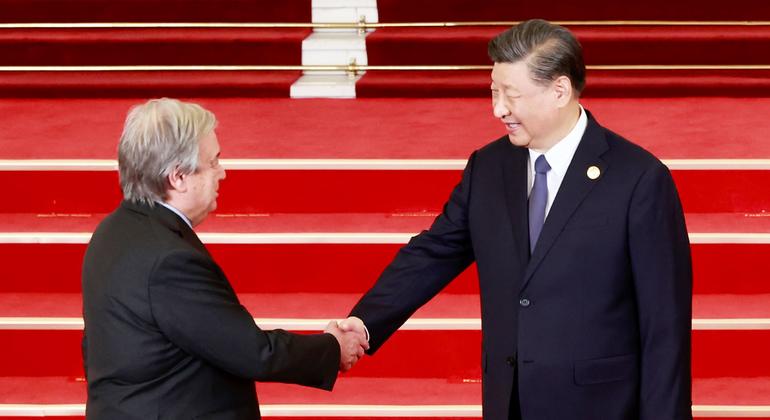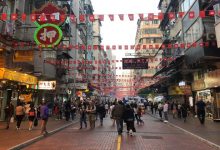Guterres Says Fix It: Nature is in Danger, Urges Stop to ‘Infrastructure Emergency’
 Infrastructure is a “crucial pathway” to generate economic growth, create decent jobs, transform energy systems, and advance sustainable development, the UN Secretary-General said in an address to world leaders meeting in Beijing, China on Wednesday.
Infrastructure is a “crucial pathway” to generate economic growth, create decent jobs, transform energy systems, and advance sustainable development, the UN Secretary-General said in an address to world leaders meeting in Beijing, China on Wednesday.
António Guterres was speaking at the third international forum on China’s Belt and Road initiative, which has funded and built roads, power plants, bridges, ports and other facilities across developing countries over the past decade.
Although infrastructure “is the foundation of everyday life for people and economies”, Mr. Guterres recalled that billions in the developing world still lack access to basics such as water and sanitation, electricity, schools, hospitals, and modern roads, bridges, tunnels and harbours.
Crisis and opportunity
This “infrastructure crisis” is occurring as people worldwide face soaring costs of living, rising inequalities and the impacts of climate change, and as progress towards sustainable development and climate action “is slipping into reverse”.
He urged leaders to “turn the infrastructure emergency into the infrastructure opportunity”.
“The Belt and Road Initiative recognizes that we have a historic opportunity to build modern, green cities, communities and transportation and power systems that place resilience and sustainability at the heart,” he said, adding that it can make valuable contributions in two key areas of action.
Support economic sustainability
Tweet URL
The first focuses on advancing economic sustainability in developing countries by reforming the current global financial architecture, promoting effective debt-relief mechanisms and supporting a $500 billion annual Stimulus Plan to scale-up investment in the Sustainable Development Goals (SDGs).
World leaders attending the SDG Summit at UN Headquarters last month endorsed these initiatives.
“Now, in this context, a dramatic context for the developing countries, the relevance of the Belt and Road Initiative is undeniable. It has included nearly $1 trillion in cumulative investments across more than 3,000 projects around the world,” he said.
Invest in environmental sustainability
The second area for action concerns advancing environmental sustainability, which will require investments that “embed resilience and adaptation across national and local planning” and help meet the goal of limiting global temperature rise to 1.5 degrees above pre-industrial levels.
“The Belt and Road Initiative is an important instrument to make such key investments a reality,” he said.
Green Silk Road
The Secretary-General addressed this point in remarks to a high-level forum on the Green Silk Road initiative, aimed at putting Belt and Road projects and investments in harmony with nature.
Their scale, number and scope “can literally change landscapes — economies, energy systems, transportation, buildings and entire industries”, he said, “and this must be done in ways that preserve our children’s future”.
Mr. Guterres urged leaders “to ensure that projects deliver the green, sustainable infrastructure countries need to support people and ecosystems alike, while breaking free of failed development models that keep us hooked on fossil fuels.”
Again, he saw two key areas where investments can help boost efforts towards sustainability and climate action.
Clean energy for all
First, he underscored the need for “green transportation and municipal power systems” that do not pollute the environment or destroy biodiversity while providing affordable electricity for all.
“We need building and construction industries taking their impacts on nature into account across their plans and projects,” he added. “We need buildings and water and power-systems that are climate-resilient and able to continue serving communities in the face of disaster.”
Abandon fossil fuels
Additionally, any new infrastructure investment must “turbocharge a just and sustainable transition away from planet-wrecking fossil fuels towards renewable energy” – his second point.
In this regard, Mr. Guterres recalled his proposal for a Climate Solidarity Pact that pushes major emitters to slash greenhouse gas emissions. Similarly, his Acceleration Agenda urges all governments to “hit fast-forward on their energy transitions.”
The UN chief stressed the need to deliver the $100 billion commitment to support climate action in developing countries, to double adaptation finance by 2025, and operationalize the loss and damage fund at the COP28 climate conference in Dubai next month.
He also recalled his appeal to end the licensing of new oil and gas projects, scrap fossil fuel subsidies, and exit coal by 2040.
“The Green Silk Road can be a critical part of this process to fast-track a fair, equitable and just energy transition, as we bring clean and affordable power to all and travel true net-zero pathways,” he said.
Simon Blake is an experienced journalist deeply interested in international affairs and global development. Having spent years reporting on humanitarian issues, he offers a unique perspective in his coverage of United Nations news.




How can we ensure that the infrastructure development mentioned in the article also prioritizes the protection of nature and wildlife?
To ensure that the infrastructure development includes protection of nature and wildlife, it is crucial for world leaders to incorporate sustainable practices, such as incorporating green technologies, preserving natural habitats, and implementing biodiversity conservation initiatives. By integrating environmental considerations into infrastructure projects, we can safeguard nature from harm and contribute to a more sustainable future for all.
António Guterres makes a crucial point about the importance of addressing the infrastructure crisis in developing countries. It is not only essential for economic growth and job creation but also for providing basic necessities to billions of people. His call to turn the infrastructure emergency into an opportunity for sustainable development and climate action is timely and urgent.
Is the focus on infrastructure development neglecting the urgent need to address the environmental crisis highlighted in the article?
Emma, the focus on infrastructure development is indeed crucial for economic growth and sustainable development. However, it is essential to ensure that environmental considerations are integrated into these projects to address the urgent environmental crisis highlighted in the article. Balancing infrastructure development with environmental protection is key to creating a resilient and sustainable future.
António Guterres makes a valid point regarding the importance of infrastructure in driving economic growth and sustainable development. It is clear that addressing the infrastructure crisis is essential in providing access to basic necessities for billions in developing countries. Leaders must seize this opportunity to prioritize green and modern solutions that benefit both people and the planet.
António Guterres is absolutely right in highlighting the urgency of addressing the infrastructure crisis. As he mentioned, billions of people still lack basic necessities, and with the current challenges of climate change and inequalities, it’s crucial to turn this emergency into an opportunity for sustainable development. Let’s prioritize building modern, green infrastructure for a better future.
Mr. Guterres makes a compelling argument for the crucial role of infrastructure in shaping our future. It’s evident that the lack of basic necessities in many developing countries underscores the urgent need for action. I wholeheartedly support his call to turn this infrastructure emergency into an opportunity for sustainable development.
António Guterres makes a valid point about the importance of infrastructure in economic growth and sustainable development. It’s concerning to see the lack of access to basic necessities in many developing countries, highlighting the urgency to address this infrastructure crisis. Leaders must seize this opportunity to prioritize modern, sustainable infrastructure to tackle the challenges of climate change and inequalities.
Is investing in green infrastructure the answer to addressing the environmental challenges we are currently facing?
SarahJohnson85, investing in green infrastructure is indeed a crucial step towards tackling the environmental challenges we are confronting today. By prioritizing sustainable development and renewable energy sources in our infrastructure projects, we can work towards a greener future for generations to come.
As an environmental activist, I appreciate Guterres’ stance on the importance of addressing the infrastructure emergency to protect our planet. It’s crucial that we prioritize sustainable development and climate action in all our endeavors. Let’s turn this crisis into an opportunity for a greener future.
António Guterres’ perspective on the importance of infrastructure is crucial in today’s world. It is evident that without proper infrastructure, many communities are left without basic necessities, hindering their development and quality of life. His call to action to address the infrastructure crisis and turn it into an opportunity for sustainable development is timely and necessary for the well-being of all.